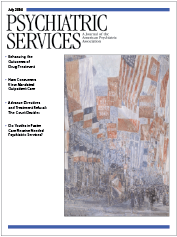Stigma and Public Education About Mental Illness
To the Editor: Advocacy is the positive representation of an issue. Patrick Corrigan's alleged "research" panders to a negative public stereotype, and thereby reinforces it.
People with mental illnesses—yes, it is plural, not a generic singular—succeed in society at the same rate as any other group of people, and at the same levels. We have won Nobel and Pulitzer prizes, Oscars, Emmy awards, and Obies—whatever awards are available, we have won them. We teach at universities, publish, preach, and represent in government at every level, including the highest. We move through society with the same ease as any other group of people, unhindered by negative stereotypes, recognized simply as people.
Dr. Corrigan's "research" begins with an enculturated bias against a nonexistent stereotype and reimposes it, and while claiming to address it, validates it. This stance is not unusual in the mental health field, where achieving popularity has greater appeal that educating the public.
In 1990 the Robert Wood Johnson Foundation funded a self-serving study by Miles Shore of Harvard University, which argued that the public's main source of information on mental health issues was the media (1). Dr. Shore carefully avoided naming the media's source. Without a doubt that source is people in the mental health professions, whom the media see as expert on the subject and with whom they consult. Until people such as Dr. Corrigan take their job as educators seriously, misconceptions will continue, journals will continue to publish articles that pander to stereotypes, and the media will promulgate them.
Mr. Maio, who lives in Fort Myers, Florida, is a consulting editor for Psychiatric Rehabilitation Journal.
1. Shore MF, Cohen MD: Robert Wood Johnson Foundation Program on Chronic Mental Illness: an overview. Hospital and Community Psychiatry. 41:1212–1216, 1990Google Scholar



